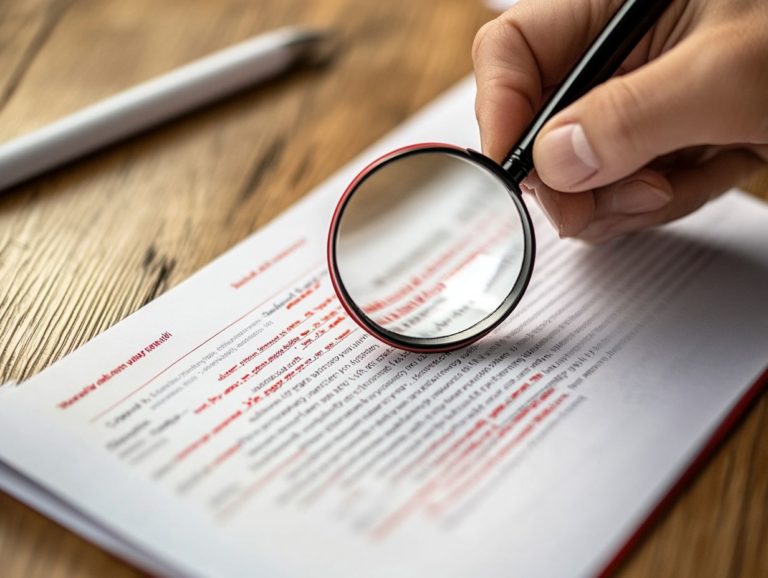How to Negotiate a Licensing Agreement: Tips and Tricks
Navigating the realm of licensing agreements may seem overwhelming, but understanding their nuances is crucial for both licensors and licensees.
This guide is your essential roadmap to mastering licensing agreements! It covers everything you need to know, from the various types of agreements and their advantages to effective negotiation techniques and essential terms to include.
It also highlights common pitfalls to avoid and offers insights on how to finalize and enforce agreements effectively.
Whether you’re embarking on a new partnership or refining an existing one, this information will equip you to negotiate with confidence.
Contents
- Key Takeaways:
- Understanding Licensing Agreements
- Benefits of Licensing Agreements
- Preparing for Negotiations
- Negotiation Strategies
- Key Terms to Include in a Licensing Agreement
- Common Pitfalls to Avoid
- Finalizing the Agreement
- Frequently Asked Questions
- Q1: What is a licensing agreement?
- Q2: Why is negotiating a licensing agreement important?
- Q3: What are some tips for negotiating a licensing agreement?
- Q4: How can I increase my negotiating power in a licensing agreement?
- Q5: How can I protect my interests in a licensing agreement?
- Q6: What are some common mistakes to avoid when negotiating a licensing agreement?
Key Takeaways:
- Research your licensing terms thoroughly.
- Plan your negotiations to ensure a successful outcome.
- Consider important clauses, such as payment terms and intellectual property rights, to protect both parties’ interests.
- Be aware of common pitfalls and mistakes to avoid during negotiations to reach a mutually beneficial agreement.
Understanding Licensing Agreements
Understanding licensing agreements is crucial for any business looking to unlock the full potential of their intellectual property and forge valuable partnerships.
A licensing agreement is a contract that allows one party to use the creations of the mind, like inventions and designs, of another, under clearly outlined terms and conditions.
This framework not only safeguards proprietary technology but also helps evaluate market potential and ensure compliance. Ultimately, it fosters thriving relationships between you and your business partners as well as prospective licensees.
Definition and Types of Licensing Agreements
License agreements are contracts that grant permission to use specific intellectual property. These come in various forms, such as exclusive and non-exclusive licenses, each carrying distinct implications for royalty rates payments made to the owner of the intellectual property for its use and usage rights.
Understanding these agreements is essential for defining the scope of use and ensuring that both parties are fully aware of their rights and responsibilities under the contract.
An exclusive license gives you sole rights to the intellectual property, meaning the licensor can’t extend this privilege to anyone else. This exclusivity often commands a higher royalty rate due to its limited availability.
Conversely, a non-exclusive license allows multiple licensees to access the same intellectual property, resulting in shared benefits and potentially lower royalty fees. For licensors, grasping these differences is crucial for optimizing revenue streams, while for licensees, evaluating the value of your investment in light of the exclusivity of your rights is important.
Benefits of Licensing Agreements
The advantages of licensing agreements reach beyond simple financial exchanges; they serve as strategic tools for generating revenue, enhancing market competition, and reinforcing brand integrity through effective technology commercialization.
Advantages for Both Parties
Licensing agreements present numerous benefits for both parties. They offer enhanced revenue generation, greater market potential, and a valuable opportunity for relationship building that can pave the way for future collaborations.
These arrangements provide licensors with a steady stream of income without the burdens of extensive investment in production and distribution.
At the same time, licensees can leverage established brands or technologies, accelerating their market entry.
By utilizing the credibility and recognition of well-known products, you gain a competitive edge while minimizing the risks that typically accompany new ventures.
As both parties engage and build trust through these agreements, they lay the groundwork for future partnerships, opening doors to innovative projects and expanded product lines that yield long-term benefits for everyone involved.
Preparing for Negotiations

Prepare thoroughly for your negotiations! Meticulous research and thorough planning, diligent due diligence, and careful assessment of value are essential to securing a successful licensing agreement.
Working with a lawyer helps you understand the complicated legal documents, ensuring you are well-equipped to handle every aspect of the process.
Research and Planning
Effective research and planning are important for licensing negotiations. They help you grasp market demand.
You can craft a viable economic model and set favorable terms.
By diving deep into comprehensive data analysis and competitor insights, you can uncover crucial trends that influence consumer preferences and behaviors.
This knowledge shapes your pricing strategies and reveals potential revenue streams. It also guides your resource allocation.
Recognizing shifts in the market landscape allows you to pivot your business model with agility. This ensures sustainability amid competition.
Thorough planning lays the groundwork for drafting agreements that align with your immediate goals and long-term growth ambitions.
Negotiation Strategies
Mastering negotiation strategies helps you achieve better outcomes. With effective techniques, you can successfully navigate discussions and protect your interests.
Effective Techniques for a Successful Agreement
Using effective techniques is key for successful agreements. Focus on active listening.
This helps you understand everyone’s perspectives, which is crucial for pinpointing common goals.
Techniques like brainstorming can ignite creative solutions. They pave the way for innovative compensation options that might not have been considered otherwise.
Establishing rapport through personalized communication and shared values is vital. This foundation amplifies trust and openness throughout the negotiation process.
Ultimately, a collaborative mindset enriches the conversation and nurtures lasting partnerships. This ensures all parties depart feeling satisfied and valued.
Key Terms to Include in a Licensing Agreement
When you are crafting a licensing agreement, it’s crucial to include key terms that protect both parties, as outlined in the guide on how to use licensing agreements for product development.
Consider termination provisions. Quality control measures and clear contract terms are also essential to prevent potential disputes.
Important Clauses to Consider

Important clauses protect both parties in a licensing deal. These clauses outline financial responsibilities.
They include licensing fees and royalties while providing specific guidelines on how to handle proprietary information.
By incorporating confidentiality provisions, the agreement safeguards sensitive information from unauthorized disclosure. This fosters an atmosphere of trust between both parties.
Stipulations regarding the protection of trade secrets are crucial for maintaining your competitive edge. They prevent any misuse or infringement.
These key clauses contribute to a balanced relationship. They promote transparency and reduce risks. This allows you and the other party to concentrate on achieving mutual goals with confidence.
Common Pitfalls to Avoid
Navigating licensing agreements can be daunting. To avoid common pitfalls and ensure you know how to protect your rights in a licensing agreement, you can maintain successful relationships.
Due diligence and meticulous planning are crucial for your success.
Mistakes to Watch Out for
Mistakes in licensing agreements, such as negotiation errors, compliance failures, and insufficient consultation with legal counsel, can lead to significant setbacks and potential disputes. Your vigilance is crucial.
Such oversights may result in financial losses, restrict your market access, or expose you to legal liabilities that could jeopardize your business operations. Failing to clearly define terms or overlooking critical obligations can have consequences that ripple through various facets of your organization.
For example, mishandling trademark rights can lead to unauthorized usage, while neglecting compliance with regulatory standards can invite penalties.
This shows how crucial it is to work with skilled legal professionals who can offer insights into industry standards and help you avoid potential pitfalls. Engaging legal counsel streamlines the drafting process and ensures that your agreement aligns with your broader business strategy, effectively mitigating risks along the way.
Finalizing the Agreement
Finalizing the agreement goes beyond merely signing on the dotted line. It requires a comprehensive understanding of the accompanying legal documents and a well-crafted strategy for monitoring compliance.
This is essential to ensure that the terms are upheld and enforced effectively.
Signing and Enforcing the Agreement
Signing and enforcing the agreement are vital steps in the licensing process. Understanding the nuances of legal documents and establishing robust systems to check if everyone is following the rules can help prevent misunderstandings and disputes.
The importance of the agreement goes beyond the act of signing; it lays the groundwork for a fruitful relationship between the parties involved. Implementing mechanisms to enforce the terms ensures that both sides fulfill their obligations, significantly reducing the risk of breaches.
Monitoring compliance is crucial in maintaining adherence to the stipulations outlined in the document. It allows you to identify potential violations early, promoting transparency and accountability.
Termination provisions protect both parties’ interests by offering a clear course of action if circumstances take a turn for the worse. Understanding these elements enhances the chances of a successful and harmonious licensing experience.
Frequently Asked Questions
Here are some common questions about licensing agreements.

Q1: What is a licensing agreement?
A1: A licensing agreement is a legally binding contract between two parties. The party giving permission (licensor) grants the other party (licensee) the right to use their intellectual property (like trademarks, patents, or copyrights) for a specific purpose.
Q2: Why is negotiating a licensing agreement important?
A2: Negotiating a licensing agreement is important because it allows both parties to reach a mutual understanding on the terms and conditions of using the intellectual property. This ensures satisfaction with the terms and helps avoid future conflicts.
Q3: What are some tips for negotiating a licensing agreement?
A3: Tips include doing thorough research on the intellectual property and its market value, understanding your own needs and priorities, setting clear and achievable objectives, and being open to compromise for mutually beneficial solutions.
Q4: How can I increase my negotiating power in a licensing agreement?
A4: You can increase your negotiating power by showcasing the unique value you bring, emphasizing your expertise in the industry, and having a well-prepared and organized negotiation strategy.
Q5: How can I protect my interests in a licensing agreement?
A5: Clearly define the terms and conditions of the agreement, including the scope of use, duration, and any restrictions. It’s also wise to seek legal advice and ensure a thorough understanding of the contract before signing.
In conclusion, understanding the intricacies of licensing agreements and engaging with experienced professionals can significantly enhance your business’s success. Don’t hesitate to seek help when needed!
Q6: What are some common mistakes to avoid when negotiating a licensing agreement?
A6: One common mistake is not fully understanding the intellectual property and its market value. Another is failing to clearly define the terms and conditions.
Being flexible and open to compromise is crucial. Finally, don t rush into an agreement without reviewing all parts of the contract carefully!






